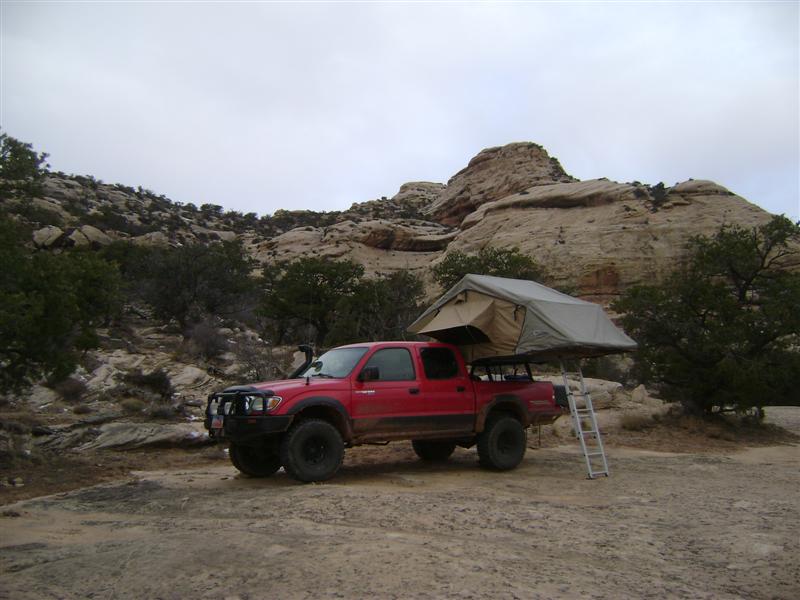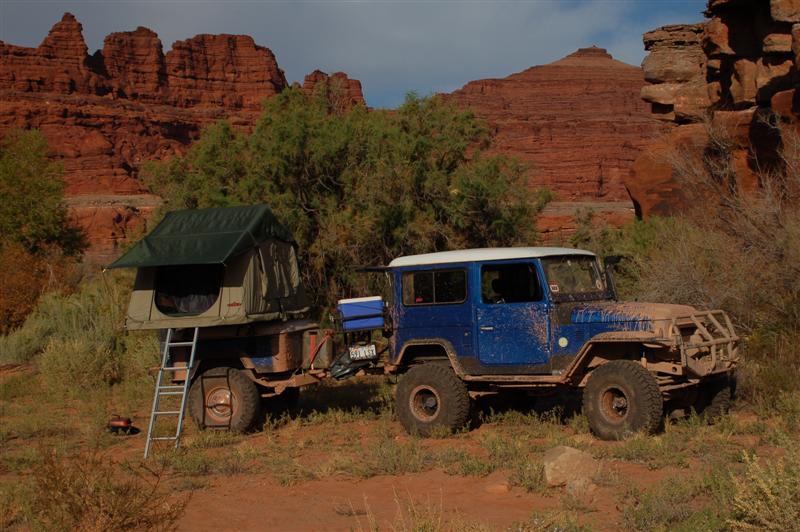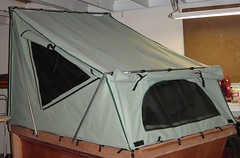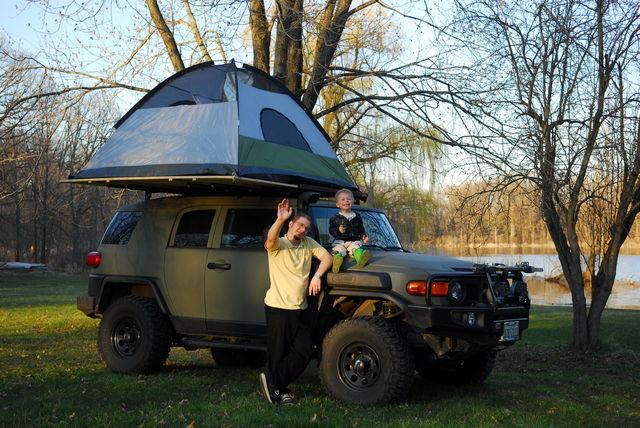- Location
- Sandy, Ut
Is a Roof Top Tent for me? The RTT Conundrum

(ARB Simpson III Tent - Beef Basin, 2009)
I get asked this question quite often, be it from customers, fellow travelers or randoms that wander into camp and peer at these strange devices. The delivery of my answer may change a bit but the overall message is the same, "it depends". Its not a cut and dry yes or no, rather it depends on the individual situation. Everyone has different needs and ultimately they need to decide if the tent works for them.

(Mombasa Expedition Series (Gen 2) - Lockhart Basin, 2007)
I thought I would concentrate my thoughts and expand on the a bit. This isn't meant to be the definitive guide on how to decide, rather my personal thoughts and experience from both a user of roof top tents (RTT's) and a retailer of them alike. Through my travels I've had the opportunity to spend several hundred nights in RTT's and closely examine many (most) of the different brands on the market. Units from Italy, South Africa, Australia, Asia and South America ranging in price from $400 to $3000+. The range of tents is radical, thus I'm not attempting to break down the difference between them as these are often best done in person or in an entirely different article. If there is any interest in product reviews of the tents I retail and use I would be more than happy to oblige.
First a quick history on RTT's. As best as anyone can decipher, the first units were likely home built or low production units built in the late 40's and early 50's when auto 'touring' started to gain in popularity in both the US and overseas. Though it would have been more common at the time to see them on a family station wagon than a 4x4. By the late 50's Italian manufacture Autohomewas building production tents. Fast forward to the late seventies/early eighties and South African companies like Eezi-Awn, Hannibal, and Howling Moon had started mass production for their local markets and later for international export sales. Regions in Africa and Australia absolutely live by them, you don't camp on the ground there like you would here. "Keeping you out of the food chain" they often say.

(Mombasa Gen 1 - Hole in the Rock Trail, 2006)
Now do you need one?
Lets start with a quick run down of the basic pro's and con's. They are in no particular order users will weight them differently based on their personal needs.
Pro's
- The do a good job of keeping you out of the food chain
- They stay cleaner and bug free in comparison.
- Mounted, set it and forget it. Its one less thing to load in the back of the rig and in many cases uses previously unused room up on the roof.
- No need for level ground, its far easier to toss a couple rocks under a tire than it is to try and find a level flat spot for a ground tent.
- Built in mattress in most models. Some allow you to leave sleeping bags and pillows stowed with the tent too.
- No stakes, guy wires or ground covers.
- All season camping. Some better than others in this regard, they can be equipped with winter hoods, tent heaters, electric blankets, etc.
- Fast setup. Some as quick as a minute, most under 10 minutes from the time you turn of the ignition to the time your zipping up the door and slipping into your bag. I've got mine down to a couple of minutes.
- They are quite comfortable and roomy, depending on the model they can be well suited for 2-3 adults or 2 adults several children.
- Can be mounted over a pickup bed, over a flatbed, on a trailer or the conventional roof top setup.
Con's
- Expensive, simply put. For a good reason. They have a remarkable amount of engineering, fabrication and assembly, far more than the average ground tent. That is not to say the price is proportionally fair compared to a ground tent, but given the radical market ratio of the two options, its easy to see why RTT's manufactures have to demand a higher price to turn any kind of profit.
- Must have vehicle capable of mounting. Some vehicles simply do not, either they don't have the needed mounts or the factory mounts are not up to the task. Additionally you may have to purchase mounting systems, load bars or even a tent compatible roof rack to mount and distribute the load.
- Your tied to your vehicle. Where you can get your vehicle will dictate where you camp. So if your camping at a state park or improved campground, you'll likely be setting up your tent in the parking area while the ground tent guys are in the soft grass.
- Basecamps require your vehicle stay put or pack it up daily. This is one of the bigger deal breakers for most. Unless your style of travel has you on the move each day, the RTT might be a pain. You would have to unload, stow and cover the tent each morning, just to redeploy that night. A deal breaker? Maybe. While its just a few minutes to set the tent, all the gear that would normally be left in a ground tent (clothes bags, blankets, etc has to go back in the rig or left in the open at camp.
- Constant weight and clearance on top of your vehicle. A RTT can weigh anywhere from 50 lbs to 150 lbs and stand an additional 12" or more above the standard roof line. A run in with a tree or scuff against a rock could result in an expensive repair or replacement. Along with that they can affect the aerodynamics of your rig and result in lower fuel mileage.
- Can be uncomfortable or dangerous with children. With a typical on the roof mount, you could be dealing with a tent that is six feet off the ground. The middle of the night bathroom breaks could be more of a pain.
- Size issues. For a larger family or even a small family that packs a bunch of stuff, a RTT may not work or will feel very claustrophobic.
- Cold. All that air underneath you makes for a cold tent. Most manufactures have offset this by using foam filled bases and thick mattresses but its worth mentioning.
- No matter how much you spend on a RTT, it is still just a tent. On the ground or on the trailer or vehicles and a windy night can leave you restless. If this is a concern perhaps a hard sided camper or shell on a truck would be a more suitable investment.
Ultimately they are just another piece of gear, another tool that can potentially make your camping experience that much better. Some feel that having a mounted RTT will allow them to camp and get out more often, maybe I suppose but it hasn't proven to be the case, I would not recommend buying one with that line of thinking. Others have wives and kids that "may" camp more often if they had a RTT. I would challenge you to really decide if that is truly the case, it very well could be, or it could be an expensive trial. At the end of the day they are just a place to sleep and beyond the easy of use and setup time, can't really preach to offer any better sleeping experience than that of a ground tent. For me personally, the benefit comes in terms of that extra time I save at camp, the place I'm able to camp comfortably. Additionally I like to leave as much stuff loaded in between trips, so not having to worry about packing the tent, sleeping bags and pillows does the trick. Your results may vary.
So after reading this I would ask you the question. Is a roof top tent for you?
Common Roof Top Rent Brands: (Circa 2009, see new list below)
3 Dog Camping
African Outback
Anaconda Tents
ARB
Autohome
Camping Lab
Eezi-Awn
Expedition Cabin
Hannibal
Howling Moon
James Baroud Tent
Mare
Mombasa
MyWay
(these are just the common names, there are literally dozens of other smaller, re-badged or our out of business manufactures/brands)
Pics of some of the popular models to get your minds thinking
Autohome Maggiolina

Eezi-Awn Family Tent

African Outback Aluminum Base Tent
Feel free to add you personal experiences and pictures of your RTT too!
Updated Manufacturer/Labeler List (US based or distributed)
23 Zero (Utah based too) Copy/Paste
Adventure Sole
Anaconda
Bigfoot
Bundutec
Camco
CVT
Darche (copy/paste)
EcoTrek
Feldon
Freespirit Recreation
Front Runner
Geo4wd
Gordigear
Hinterland/Hitents
Hutch Tents -https://hutchtents.com/ (copy/paste)
IKamper
James Baroud
Odin Designs
O-Spec
OverRoam Roof Top Tent (Denver Outfitters)
OverlandLabs
OverlandingOffroad: http://www.overlandingoffroad.com/index.php
OverlandPros
Roam Adventure Co (copy/paste design)
Roost
Sahara 4x4
Smittybilt
Tepui
TopTent
TJM
Tuff Stuff
Treelike Outdoors
Wild Coast Tents
Last edited:







